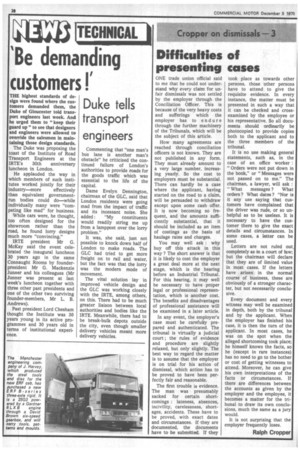Difficulties presenting of cases
Page 30

If you've noticed an error in this article please click here to report it so we can fix it.
ONE trade union official said to me that he could not understand why every claim for unfair dismissals was not settled by the employer through the Conciliation Officer. This is because of the very heavy costs and sufferings which the employer has to endure through the further machinery of the Tribunals, which will be the subject of this article.
How many agreements are reached through conciliation officers is not known. They are not published in any form. They must already amount to a very large number, increasing yearly. So the cost to employers must be substantial. There can hardly be a case where the applicant, having started on the road to a claim, will be persuaded to withdraw except upon some cash offer. It is now becoming so frequent, and the amounts sufficiently substantial, that it should be included as an item of costings as the basis of haulage rates and charges.
You may well ask : why buy off this attack in this way ? The short answer is that it is likely to cost the employer a great deal more at the next stage, which is the hearing before an Industrial Tribunal. For this hearing, it may well be necessary to have proper legal or professional representation, which is another cost. The benefits and disadvantages of professional assistance will be examined in a later article.
In any event, the employer's case must be carefully prepared and authenticated. The tribunal is virtually a judicial court ; the rules of evidence and procedure are slightly relaxed, but only slightly. The best way to regard the matter is to assume that the employer is on trial for his action of dismissal, which action has to be proved to have been perfectly fair and reasonable.
The first trouble is evidence. The man was presumably sacked for certain shortcomings : lateness, absences, incivility, carelessness, shortages, accidents. These have to be proved, . with exact dates and circumstances. If they are documented, the documents have to be submitted. If they took place as towards other persons, those other persons have to attend to give the requisite evidence. In every instance, the matter must be presented in such a way that it can be checked and crossexamined by the employee or his representative. So all docu ments should ordinarily be photocopied to provide copies both to the applicant and to the three members of the tribunal.
It is no use making general statements, such as, in the case of an office worker : "Orders were not put down in the book," or "Messages were not passed on to me," The chairman, a lawyer, will ask : "What messages ? What orders ? What dates ? "Nor is it any use saying that cus tomers have complained that the driver was rude, or so un helpful as to be useless. It is necessary to have the customer there to give the exact details and circumstances. In some cases, a letter can be used.
Letters are not ruled out, completely as in a court of law; but the chairman will declare that they are of limited value in most cases. If the letters have arisen in the normal course of business, these are obviously of a stronger character, but not necessarily conclusive.
Every document and every witness may well be examined in depth, both by the tribunal and by the applicant. When the employer has finished his case, it is then the turn of the applicant. In most cases, he was on the spot when the alleged shortcoming took place; he himself knows the facts, so he (except in rare instances) has no need to go to the bother or cost of getting witnesses to attend. Moreover, he can give his own interpretations of the facts or circumstances. If there are differences between the accounts as given by the employer and the employee, it becomes a matter for the tribunal to draw its own conclusions, much the same as a jury would.
It is not surprising that the employer frequently loses.
Ralph Cropper


































































































































